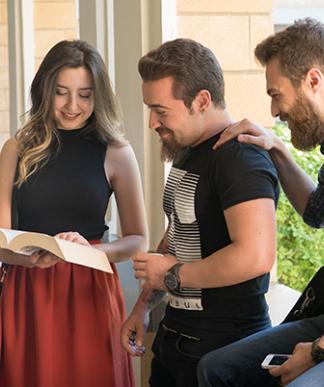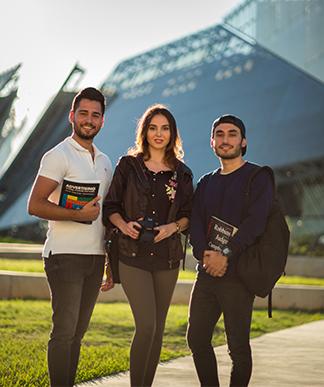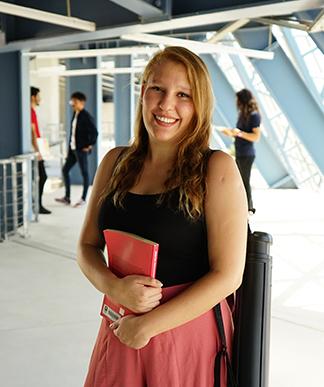


About the Department
The Turkish Language and Literature Undergraduate Program trains qualified individuals who can educate themselves in the field of Turkish language, culture, and literature in line with the mission of the Cyprus International University. The department aims to benefit the country and society by sharing knowledge via education and training, in order to be able to successfully represent the university. Various trips and social activities are organized to ease students' social adaptation. Conferences, panels, etc. are also organized on a regular basis. Through academic meetings, our students have the opportunity to meet and talk with experts working in this field and in different fields. During national memorial days, activities are organized with the contributions of students. Furthermore, foreign language learning is encouraged.
Accreditations
Turkish Language and Literature Program has been accredited by the Association for the Evaluation and Accreditation of Science, Literature, Science-Literature, Language and History-Geography (FEDEK), which is a leading accreditation institution, since 24th February 2018, and continues its educational activities within this framework.
Education Opportunities
The program, besides the lessons of the main branches of science, offers courses such as Turkish Folk Literature, New Turkish Literature, Old Turkish Literature and Turkish Language, Western Literature, World Literature, Turkish Cypriot Literature, Turkish Culture History, Thought History, Aesthetics, Children's Literature, and Mythology. In the course of Turkish Folk Literature and Folklore, students gain the skills of analyzing and interpreting Turkish folk culture. In addition to studying the literary trends of Tanzimat in the course of the New Turkish Literature, students develop skills of critical thinking built on a scientific basis and with the examination of selected texts in light of contemporary art movements, literary theories, and criticism methods. In old literary teaching the following subjects will be discussed: classification of Turkish Literature History, sources of Turkish Literature, decomposition of People, Divan and Tekke-Sufi literature, starting from Pre-Islamic Process XII.

Career Areas
Graduates of the Department of Turkish Language and Literature can teach Turkish language and literature in secondary education within the framework of the relevant legislation. They can produce programs, become news editors or presenters in radio and television broadcasting organizations. Those who develop themselves in the field of Ottoman Turkish may be directed to libraries and archival institutions. They can also edit the Turkish language used in the media. They can work in various private and official institutions in the field of folklore. The field of artistic production of literature is also a bright and interesting undertaking for our graduates. The lessons given to the Turkish world would provide broad business opportunities for those seeking to work in the Central Asian Turkic Republics. If students decide to pursue our graduate programs, they can graduate from a Ph.D. degree in science to be able to work at various universities as teaching staff.
Contact
Faculty of Arts and Sciences
Education and Humanities Center, EH113
Tel: +90 392 671 1111 Extension: 2601
Faculty E-mail: secretary-fas@ciu.edu.tr
Compulsory Courses
First Semester
ENGLISH-I
Course code
INGL121Credit
0Theoretical
3Practical
0Ects
4MODERN TURKISH HISTORY
Course code
TARH100Credit
0Theoretical
2Practical
0Ects
2OTTOMAN TURKISH-I
Course code
TDED103Credit
3Theoretical
3Practical
0Ects
5CONTEMPORARY TURKISH LITERATURE-I
Course code
TDED105Credit
3Theoretical
3Practical
0Ects
5LITERATURE KNOWLEDGE AND THEORIES-I
Course code
TDED109Credit
2Theoretical
2Practical
0Ects
4TURKISH GRAMMAR-I: PHONOLOGY AND MORPHOLOGY
Course code
TDED111Credit
3Theoretical
3Practical
0Ects
5INTRODUCTION TO CLASSIC TURKISH LITERATURE-I
Course code
TDED113Credit
3Theoretical
3Practical
0Ects
5Second Semester
BASIC COMPUTING
Course code
BILT110Credit
3Theoretical
2Practical
2Ects
4ENGLISH-II
Course code
INGL122Credit
0Theoretical
3Practical
0Ects
4OTTOMAN TURKISH-II
Course code
TDED104Credit
3Theoretical
3Practical
0Ects
4CONTEMPORARY TURKISH LITERATURE-II
Course code
TDED106Credit
3Theoretical
3Practical
0Ects
4LITERATURE KNOWLEDGE AND THEORIES-II
Course code
TDED110Credit
2Theoretical
2Practical
0Ects
3TURKISH GRAMMAR-II: LEXICOLOGY
Course code
TDED112Credit
3Theoretical
3Practical
0Ects
5INTRODUCTION TO CLASSIC TURKISH LITERATURE-II
Course code
TDED114Credit
3Theoretical
3Practical
0Ects
5Third Semester
TURKISH GRAMMER-III: SYNTAX
Course code
TDED201Credit
3Theoretical
3Practical
0Ects
5CLASSIC TURKISH LITERATURE-I
Course code
TDED203Credit
3Theoretical
3Practical
0Ects
5CONTEMPORARY TURKISH LITERATURE-III
Course code
TDED205Credit
3Theoretical
3Practical
0Ects
5WRITTEN EXPRESSION
Course code
TDED215Credit
3Theoretical
3Practical
0Ects
4TURKISH FOLK LITERATURE-I
Course code
TDED217Credit
3Theoretical
3Practical
0Ects
5AREA ELECTIVE
Course code
TDEDXX1Credit
3Theoretical
3Practical
0Ects
6Fourth Semester
LINGUISTICS
Course code
TDED202Credit
3Theoretical
3Practical
0Ects
6CLASSIC TURKISH LITERATURE-II
Course code
TDED204Credit
3Theoretical
3Practical
0Ects
6CONTEMPORARY TURKISH LITERATURE-IV
Course code
TDED206Credit
3Theoretical
3Practical
0Ects
6TURKISH FOLK LITERATURE-II
Course code
TDED218Credit
3Theoretical
3Practical
0Ects
6AREA ELECTIVE
Course code
TDEDXX2Credit
3Theoretical
3Practical
0Ects
6Fifth Semester
CONTEMPORARY TURKISH LITERATURE-V
Course code
TDED301Credit
3Theoretical
3Practical
0Ects
5CLASSIC TURKISH LITERATURE-III
Course code
TDED303Credit
3Theoretical
3Practical
0Ects
5MODERN TURKISH LANGUAGES
Course code
TDED307Credit
2Theoretical
2Practical
0Ects
3TURKISH FOLK LITERATURE-III
Course code
TDED319Credit
3Theoretical
3Practical
0Ects
5AREA ELECTIVE
Course code
TDEDXX3Credit
3Theoretical
3Practical
0Ects
6AREA ELECTIVE
Course code
TDEDXX4Credit
3Theoretical
3Practical
0Ects
6Sixth Semester
CONTEMPORARY TURKISH LITERATURE-VI
Course code
TDED302Credit
3Theoretical
3Practical
0Ects
6CLASSIC TURKISH LITERATURE-IV
Course code
TDED304Credit
3Theoretical
3Practical
0Ects
6TURKISH FOLK LITERATURE-IV
Course code
TDED320Credit
3Theoretical
3Practical
0Ects
6AREA ELECTIVE
Course code
TDEDXX5Credit
3Theoretical
3Practical
0Ects
6AREA ELECTIVE
Course code
TDEDXX6Credit
3Theoretical
3Practical
0Ects
6Seventh Semester
COMMUNITY SERVICE PRACTICES
Course code
SOSH100Credit
2Theoretical
1Practical
2Ects
3CONTEMPORARY TURKISH LITERATURE-VII
Course code
TDED401Credit
3Theoretical
3Practical
0Ects
5CLASSIC TURKISH LITERATURE-V
Course code
TDED403Credit
3Theoretical
3Practical
0Ects
5TURKISH FOLK LITERATURE-V
Course code
TDED417Credit
3Theoretical
3Practical
0Ects
5AREA ELECTIVE
Course code
TDEDXX7Credit
3Theoretical
3Practical
0Ects
6UNIVERSITY ELECTIVE
Course code
UNISXX1Credit
3Theoretical
3Practical
0Ects
3Eighth Semester
CONTEMPORARY TURKISH LITERATURE-VIII
Course code
TDED402Credit
3Theoretical
3Practical
0Ects
5CLASSIC TURKISH LITERATURE-VI
Course code
TDED404Credit
3Theoretical
3Practical
0Ects
5RESEARCH METHODS FOR LANGUAGE AND LITERATURE
Course code
TDED408Credit
2Theoretical
2Practical
0Ects
3TURKISH FOLK LITERATURE-VI
Course code
TDED418Credit
3Theoretical
3Practical
0Ects
5AREA ELECTIVE
Course code
TDEDXX8Credit
3Theoretical
3Practical
0Ects
6UNIVERSITY ELECTIVE
Course code
UNISXX2Credit
3Theoretical
3Practical
0Ects
4Elective Courses
CLASSIC ANATOLIAN TURKISH
Course code
TDED209Credit
2Theoretical
2Practical
0Ects
6MODERN TURKISH LITERATURE-POETRY
Course code
TDED213Credit
2Theoretical
2Practical
0Ects
MODERN TURKISH LITERATURE-PROSE
Course code
TDED210Credit
2Theoretical
2Practical
0Ects
6FOLKLORE
Course code
TDED214Credit
2Theoretical
2Practical
0Ects
HISTORY OF THE TURKISH CULTURE
Course code
TDED312Credit
3Theoretical
3Practical
0Ects
HISTORICAL TURKISH DIALECTS
Course code
TDED411Credit
2Theoretical
2Practical
0Ects
WORLD LITERATURE
Course code
TDED416Credit
3Theoretical
3Practical
0Ects
HISTORY OF THOUGHT
Course code
TDED315Credit
2Theoretical
2Practical
0Ects
TURKISH TEACHING METHODS
Course code
TDED413Credit
3Theoretical
3Practical
0Ects
0OSMANLICA METİN İNCELEMELERİ
Course code
TDED211Credit
3Theoretical
3Practical
0Ects
6AESTHETICS
Course code
TDED317Credit
3Theoretical
3Practical
0Ects
6CYPRUS TURKISH LITERATURE
Course code
TDED412Credit
3Theoretical
3Practical
0Ects
0HISTORY OF THE TURKISH LANGUAGE
Course code
TDED222Credit
3Theoretical
3Practical
0Ects
THEATRE-DRAMAZATION
Course code
TDED313Credit
3Theoretical
3Practical
0Ects
3POETRY SCIENCE
Course code
TDED316Credit
2Theoretical
2Practical
0Ects
ART THEORIES
Course code
TDED414Credit
2Theoretical
2Practical
0Ects
MYTOLOGY
Course code
TDED415Credit
3Theoretical
3Practical
0Ects
4OTTOMAN SOCIAL LIFE AND LITERATURE
Course code
TDED220Credit
3Theoretical
3Practical
0Ects
6CURRENT PROBLEMS OF TURKISH
Course code
TDED410Credit
3Theoretical
3Practical
0Ects
6COMPERATIVE LITERATURE
Course code
TDED310Credit
3Theoretical
3Practical
0Ects
6CHILDREN'S LITERATURE
Course code
TDED407Credit
3Theoretical
3Practical
0Ects
NEW METHODS IN TEACHING TURKISH
Course code
TREG425Credit
2Theoretical
2Practical
0Ects
SCIENTIFIC METHOD AND CRITICAL THINKING
Course code
FELS220Credit
3Theoretical
3Practical
0Ects
OLD TURKISH LITERATURE BIOGRAPHY WRITING
Course code
TDED318Credit
3Theoretical
3Practical
0Ects
6Text Analysis in Old Turkish Literature
Course code
TDED311Credit
3Theoretical
3Practical
0Ects
6HISTORY OF MODERN CYPRUS
Course code
TARH220Credit
3Theoretical
3Practical
0Ects
4HISTORY OF MODERN CYPRUS
Course code
HIST220Credit
3Theoretical
3Practical
0Ects
4TRNC citizens and TR citizen candidate students who have completed their entire high school education in TRNC. They are placed in undergraduate programs in line with their success in the CIU Student Placement and Scholarship Ranking Exam and the programs they prefer.
Students who are successful in the exam can register from the TRNC Marketing Office.
TR Students who are successful in the exams conducted by the Higher Education Council Student Selection and Placement Center (ÖSYM) and are entitled to enroll in our university in line with their preferences can complete the registration process with the necessary documents for registration from our Registration and Liaison Offices throughout Turkey or from the Marketing Directorate on campus.
Click for detailed admission requirements information.
Tuition Fees are determined at the beginning of each academic year. Candidate students who are entitled to enroll in CIU can learn their fees in line with the Tuition Fee Calculation system.